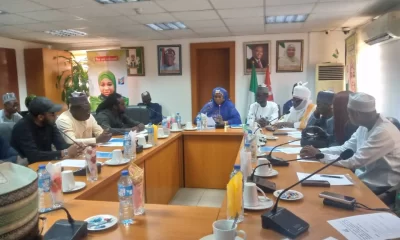Health
HIV/AIDS: FG Restates Commitment To 2030 Elimination Deadline

L-R: Rivers State Chairman, SOMTEC, Mr Oliver Wolugbom, UNICEF Observer, Mr Felix Obekpa, Secretary, Pastor Paulinus Nsirim and a member, Mrs Ruhunna Kejeh, during the maiden SOMTEC’s revitalisation meeting in Port Harcourt, recently
The Federal Government
has reiterated its commitment in strengthening the health sector towards achieving the global goal of eliminating HIV/AIDS by the year 2030.
The health minister, Dr. Osagie Enahire who stated this at a news conference to mark the 2015 World AIDS Day with the theme “Getting to Zero: Ending HIV/AIDS by 2030”, recently, said that the theme was aimed at zero new Hiv infection, zero discrimination and zero AIDS-related deaths maintaining that any increase in HIV/AIDS new cases would impact negatively on the health and economy of the nation.
While revealing that about 3.4million Nigerians living with HIV as at the end of the 2014 out of the 36.9 million persons living with the virus globally. Enahire maintain that tackling the root causes of vulnerability remained the sure way to achieving the goals.
“People are vulnerable to getting infected if they are poor and lack information and education that will keep them away from it. More so, some factors that were responsible for government to take HIV/AIDS case seriously were the fact that there was preventive vaccine and its cost of management and control were enormous,” he said.
The Minister explained that Nigeria was currently treating no fewer than 800,000 people living with the virus with the Anti Retroviral (ARV) drug and that the federal ministry of health in 2014 conducted two important surveys to collect data of infected persons.
Enahire revealed that the 2014 surveys showed a decline in HIV cases among pregnant women who attend antenatal clinics to 3.0 percent compared to 4.1 percent in 2010 adding that there was also a decline among youths from 6.0 percent in 2001 to 2.9 percent in 2014, attributing it to government’s intervention.
He therefore stressed the need for collaboration among stakeholders in the pursuit of preventing and eradicating HIV particularly among adolescents and youths, mother-to-child transmission as well as accessibility to care and treatment to aid the country achieve the 2030 deadline.
Also speaking, the Regional Director for Africa, World Health Organisation (WHO) Dr Rebecca Moeti noted that sub-Saharan Africa was the most affected by the HIV/AIDS pandemic with nearly 26 million people living with the virus while 8000,000 HIV deaths occurred in 2014.
Moeti said however, that there was a defining moment in the HIV/AIDS response as a result of remarkable progress in the level of prevention, treatment and care for those living with the virus in Africa adding that the region had achieved the millennium development goal six of halting and reversing HIV/AIDS epidemic.
Commending African governments and partners for their significant financial investments in the HIV/AIDS response, the director said “we still have to fill major gaps in the response, stigma, discrimination and punitive laws persisting in our region”.
She continued, “children, young people, adolescents and key populations are still left behind. Only 43 per cent of people needing anti-retroviral treatments have access, while only 52 per cent of people living with HIV know their status. The target is to ensure that in the next five years, 90 per cent of people living with HIV know their status and 90 per cent of people diagnosed with HIV are offered the ARV therapy and moreso, 90 per cent of people living with HIV/AIDS on treatment achieve viral load suspension. With these, Nigeria and indeed, the African region will achieve the aim of ending AIDS by 2030”.
Lady Godknows Ogbulu
Health
‘How Micro RNA Research Won Nobel Prize’
Two United States scientists who unraveled the human micro RNA have won the Nobel Prize in Physiology or Medicine 2024.
Victor Ambros and Gary Ruvkun won the coveted prize for their work on microRNA as their discoveries help explain how complex life emerged on earth and how the human body is made up of a wide variety of different tissues.
MicroRNAs influence how genes – the instructions for life – are controlled inside organisms, including humans.
Every cell in the human body contains the same raw genetic information, locked in our DNA.
However, despite starting with the identical genetic information, the cells of the human body are wildly different in form and function.
The electrical impulses of nerve cells are distinct from the rhythmic beating of heart cells. The metabolic powerhouse that is a liver cell is distinct to a kidney cell, which filters urea out of the blood.
The light-sensing abilities of cells in the retina are different in skillset to white blood cells that produce antibodies to fight infection.
So much variety can arise from the same starting material because of gene expression.
The US scientists were the first to discover microRNAs and how they exerted control on how genes are expressed differently in different tissues.
The medicine and physiology prize winners are selected by the Nobel Assembly of Sweden’s Karolinska Institute.
They said: “Their groundbreaking discovery revealed a completely new principle of gene regulation that turned out to be essential for multicellular organisms, including humans.
“It is now known that the human genome codes for over 1,000 microRNAs.”
Health
WHO Begins Regulation On Antibiotic Waste
The World Health Organisation (WHO) has begun acting to curb effects of antibiotic pollution.
The new guidance on wastewater and solid waste management for antibiotic manufacturing sheds light on this important but neglected challenge ahead of the United Nations General Assembly (UNGA) High-Level Meeting on antimicrobial resistance (AMR) taking place on 26 September 2024.
The emergence and spread of AMR caused by antibiotic pollution could undermine the effectiveness of antibiotics globally, including the medicines produced at the manufacturing sites responsible for the pollution.
Despite high antibiotic pollution levels being widely documented, the issue is largely unregulated and quality assurance criteria typically do not address environmental emissions. In addition, once distributed, there is a lack of information provided to consumers on how to dispose of antibiotics when they are not used, for example, when they expire or when a course is finished but there is still antibiotic left over.
“Pharmaceutical waste from antibiotic manufacturing can facilitate the emergence of new drug-resistant bacteria, which can spread globally and threaten our health. Controlling pollution from antibiotic production contributes to keeping these life-saving medicines effective for everyone,” said Dr Yukiko Nakatani, WHO Assistant Director-General for AMR ad interim.
Globally, there is a lack of accessible information on the environmental damage caused by manufacturing of medicines.
“The guidance provides an independent and impartial scientific basis for regulators, procurers, inspectors, and industry themselves to include robust antibiotic pollution control in their standards,” said Dr Maria Neira, Director, Department of Environment, Climate Change and Health, WHO. “Critically, the strong focus on transparency will equip buyers, investors and the general public to make decisions that account for manufacturers’ efforts to control antibiotic pollution.”
Health
Kebbi Harmonises Doctors’ Salaries To Curb Brain Drain
In a concerted effort to curb brain drain, the Kebbi State Government has harmonised medical doctors’ salaries to be at par with their colleagues in the federal government’s tertiary health facilities.
Kebbi State Commissioner for Health, Musa Inusa-Isma’il, disclosed this at the handing over of ambulances to the state-owned health facilities at the Ministry of Health in Birnin Kebbi yesterday.
Inusa Isma’il, according to a statement by Ahmed Idris, the Chief Press Secretary to the governor, said the essence of the harmonisation was to retain the existing medical doctors and attract more to the services of the state.
According to him, the doctors across the state had already started enjoying the new salaries from August 2024.
He said the release of the vehicles was in fulfilment of Governor Nasir Idris’ promise to uplift health care services in the state.
“His Excellency said I should inform you, the beneficiaries of this gesture, that the vehicle should be strictly used for the intended purpose. It should not be used for anything else.
“If there is no referral case, each of the vehicles must be parked at the hospital by 6 pm. The governor said you should warn your drivers against reckless driving as well as violating the instructions.
“We should also do everything possible to reciprocate the gesture by working according to the terms and conditions attached,” he advised.
The benefiting health facilities included Sir Yahaya Memorial Hospital, Birnin Kebbi; State Teaching Hospital, Kalgo; General Hospital, Argungu; General Hospital, Yauri; General Hospital, Zuru; and General Hospital, Bunza.
In his speech, the permanent secretary of the ministry, Dr Shehu Koko, recalled that the ambulances were handed over to the ministry last Friday by the governor for the onward handover to the benefiting hospitals.
He observed that the ambulances would go a long way in improving the referral system in the state, adding that delays in reaching the secondary and tertiary facilities would be eliminated.
The permanent secretary attributed the high rate of maternal mortality in the country to delays in getting to the health facilities for proper medical care.
“We believe with the provision of these ambulances, part of the gaps we have in our referral system will be addressed, whereby patients who require secondary healthcare could be easily transported to secondary and tertiary health centres, where they can get such help,” he said.
In a goodwill message, Commissioner for Information and Culture Alhaji Yakubu Ahmed expressed gratitude to the governor for the support he has given to the ministry to excel.
While advising the beneficiaries to use the vehicles judiciously, the commissioner advised that services and maintenance of the vehicles must be prompt to derive the maximum benefits from the vehicles.
The commissioner also highlighted some achievements recorded by the government in the last year, including beautification of the state capital, completion of a multimillion-naira ultramodern state secretariat, road construction, construction and renovation of classrooms and upgrading of some health facilities, among others.
-

 News4 days ago
News4 days agoNCDC Allays Fears Over COVID-19 XEC Variant
-
Business16 hours ago
NNMDA To Train 5m Nigerian Youths On Cassava Plantation
-
Women10 hours ago
Cooking And Its Importance To Women
-

 News4 days ago
News4 days agoSGF Asks Northerners To Wait For 2031 Presidency
-

 News4 days ago
News4 days agoTinubu Congratulates Ghana’s President-Elect, John Mahama
-
Niger Delta14 hours ago
Bayelsa, Rivers To Establish Joint Anti-Vandalism Taskforce On National Grid, Others
-

 Business10 hours ago
Business10 hours agoFCTA, Others Chart Path To Organic Agriculture Practices
-

 Business4 days ago
Business4 days agoNCDMB Recommits To Youths’ Capacity Building

